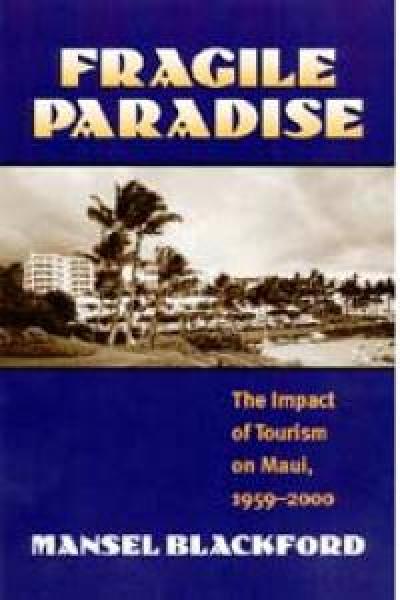Fragile Paradise: The Impact of Tourism on Maui, 1959–2000

Blackford, Mansel
With its white sandy beaches, lush green uplands, and near-perfect weather, the Hawaiian island of Maui is more than a picture postcard: it is a multi-million-dollar tourist attraction that repeatedly has been voted "best island in the world" by Conde Nast Traveler readers. Consider, then, the bumper sticker seen on residents' cars in recent years: "If it's tourist season, why can't we shoot them?"
From its modest beginnings in the prewar era, tourism has become the most important segment of Maui's economy since the 1970s. But as Mansel Blackford shows, it is also a devil's bargain. By switching the island's income base from sugar cane to condos, tourism has offered a solution to economic problems but has also placed an unanticipated strain on Maui's infrastructure and made unexpected demands of its residents. Now as roads and sewers have reached their limits and escalating property values have ousted long-timers, the growth of the "visitor industry" has forced the people of Maui to make difficult choices about the future development of their island.
Fragile Paradise chronicles the growth--and the growing pains--of the tourist economy on Maui. Blackford takes us into the heart of this island paradise to reveal the complexity of economic and environmental issues, especially as perceived by Maui's residents over the past four decades. He examines issues surrounding land-use policies, water development, electrical power generation, and transportation-particularly the controversy over the expansion of the Kahului Airport. He then shows how these issues came together in the development of two communities: the booming resort area of South Maui and the agricultural Upcountry Maui. Blackford also reveals the human side of tourism, through interviews with islanders representing both sides of the growth issue.
Blackford's study shows how people living on a far western American frontier view their economic and physical environments and how they have sought to shape them. By addressing a number of crucial issues, from race and ethnicity to "quality of life" environmentalism, it offers a microcosm of the tourism industry that has implications for other travel destinations and for the economic future of the Pacific Rim.
Investigators
Filters: 2001
